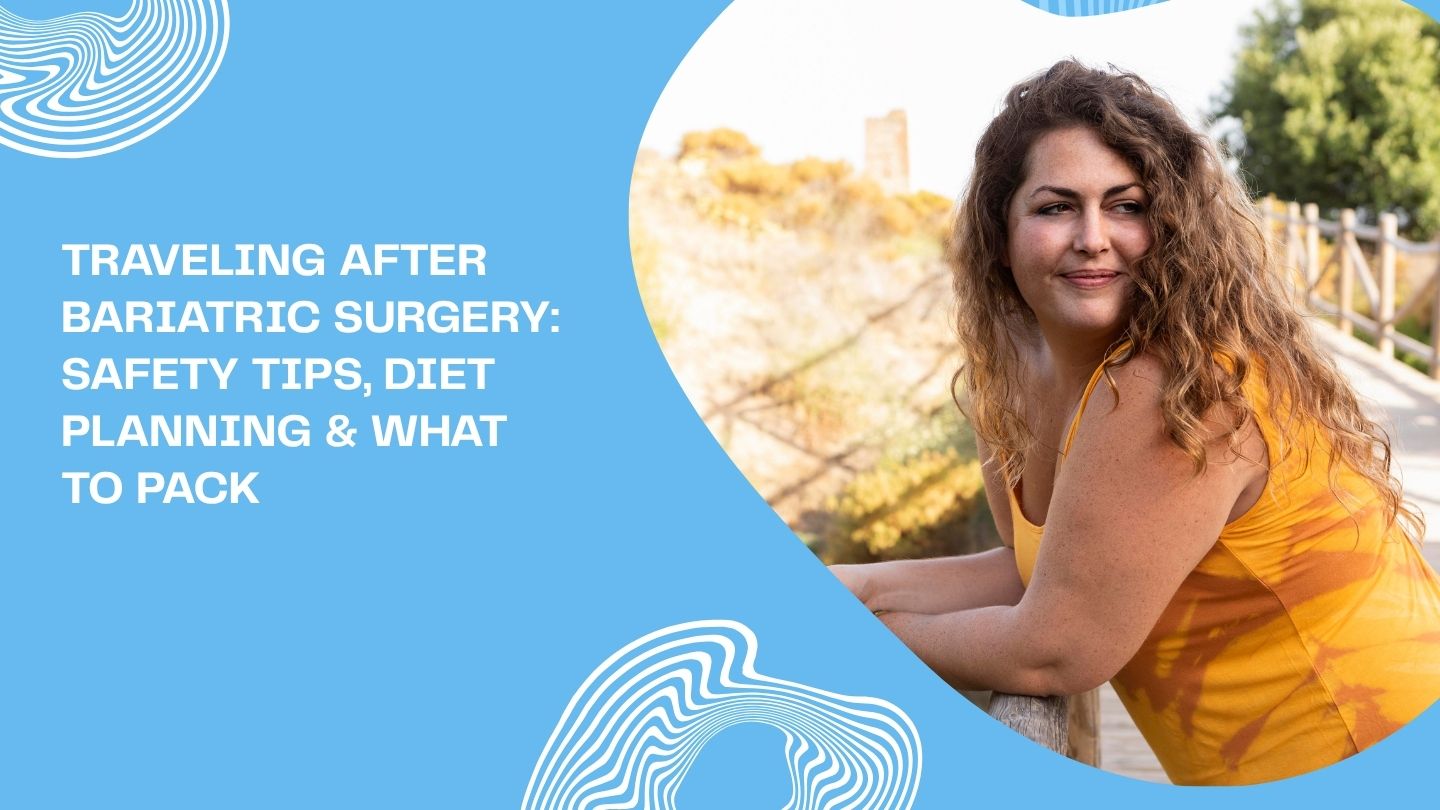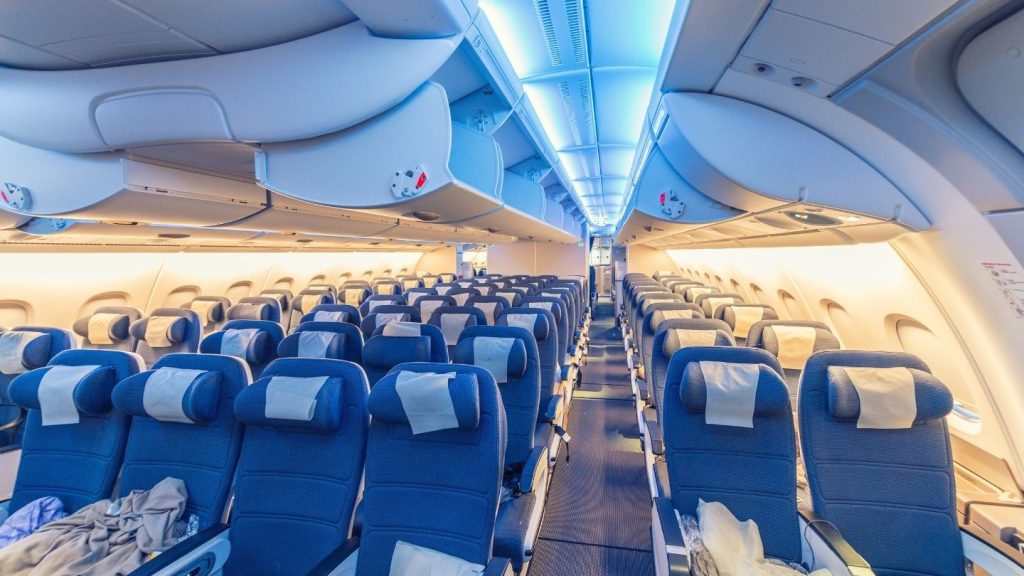
Traveling After Bariatric Surgery: Safety Tips, Diet Planning & What to Pack
Strategic mobility post-surgery demands proactive planning and disciplined adherence to your new wellness framework. With the right precautions, you can navigate trips without compromising recovery momentum or nutritional integrity. Prioritizing hydration, structured eating, and contingency readiness will keep your journey frictionless. Equip yourself with the right tools and mindset to stay aligned with your health objectives while on the move. In this blog, you’ll gain actionable insights to travel seamlessly and safeguard your post-operative progress.
Key Takeaways
- Planning ahead is essential for safe travel post-bariatric surgery. Consult your surgical team and prepare meal options in advance.
- Packing smart with nutrient-rich snacks, hydration tools, and meal prep items ensures you maintain your diet and comfort during your trip.
- Focus on enjoying your vacation by making mindful food choices and engaging in physical activities, helping you stay healthy while exploring new places.
Plan Ahead for Your Trip
The cornerstone of any successful trip, especially after bariatric surgery, is planning ahead. First and foremost, consult with your surgical team for personalized advice and to understand potential risks. This proactive step helps prevent complications and ensures a safe journey, especially in the context of weight loss surgery.
Maintain 5-6 smaller meals throughout the day to manage hunger and keep your energy levels stable. This can be challenging on a long flight or during a busy walking tour, but with some foresight, it’s manageable. Research local restaurants and grocery stores at your destination for bariatric-friendly options. Knowing where to find a healthy meal or snack saves time and reduces stress.
Consider the specifics of your travel plans. For a road trip, you’ll have more control over food choices but will need to plan rest stops. During a summer vacation, focus on staying hydrated and finding cool places to rest.
On a long-haul flight, bring snacks and stay hydrated to avoid fatigue and discomfort. Thoughtful planning ensures a smooth and enjoyable vacation experience on long-haul flights. You’ll benefit from understanding how no caffeine after bariatric surgery supports stable hydration levels during travel days.
Pack Smart: Essential Items for Bariatric Patients
Packing smart is crucial, particularly for bariatric patients. Ensuring you have everything you need makes your travel experience more comfortable and stress-free. Start with protein bars, pre-portioned nuts, and protein shakes to meet your nutritional needs. These items are convenient and help maintain portion control while avoiding unhealthy fast food options.
A refillable water bottle is another critical item. Hydration is crucial, especially after bariatric surgery, to support recovery and overall health. Pack your medications in their original prescription bottles, along with other health management items like compression socks to prevent blood clots during long flights.
Also, pack bariatric-friendly options like portion control containers and utensils designed to help you eat slowly and mindfully. These tools prevent overeating and help manage dumping syndrome, a common issue with gastric sleeve surgery or other bariatric procedures.
Packing smart ensures you’ll be well-prepared for any situation, leading to a smoother and more enjoyable travel experience that can help you save time. Recognizing why gummy vitamins after bariatric surgery are discouraged can help you pack the right supplements for your trip.
Healthy Eating on the Go
Eating healthily on the go can be challenging, but it’s entirely possible with the right strategies. Stay in accommodations with kitchen facilities to prepare meals that align with your post-bariatric surgery dietary needs. This control over portion sizes and ingredients ensures your meals are nutritious and bariatric-friendly.
Packing a variety of healthy, nonperishable snacks helps avoid the temptation of fast food and gas station snacks. Consider items like protein bars, nuts, and dried fruits. These snacks are convenient and help maintain energy levels while staying on track with dietary goals.
When dining out, consider the following tips to manage portion size and aid digestion:
- Be mindful of portion sizes, as restaurant servings are often larger than necessary.
- Share main courses with your travel companions or request a to-go container to manage portions effectively.
- Eat slowly and chew thoroughly to aid digestion and prevent discomfort.
Avoid consuming liquids during meals to ensure proper digestion and prevent overeating. Following these tips allows you to enjoy delicious meals while maintaining your health goals and overall well-being. Maintaining structured eating becomes easier when applying principles from meal prep portion control for bariatric surgery patients as you plan your travel meals.
Staying Hydrated
Hydration is paramount, especially when traveling. To stay healthy and reduce cravings, consider the following:
- Aim to drink at least 64 ounces of water daily.
- Be especially mindful in warmer climates or during long flights, where dehydration can set in quickly.
- Use a reusable water bottle to sip water consistently throughout the day.
Avoid sugary beverages, carbonated drinks, and alcohol, as they don’t hydrate effectively and can contribute to dehydration. Stick to plain water or drinks designed to keep you hydrated. Sip water slowly and consistently throughout your journey to stay hydrated without overwhelming your digestive system.
Hydration isn’t just about drinking water; it also involves maintaining overall well-being. Staying active and spending time outdoors can increase fluid intake needs, so be mindful of hydration levels, especially during physical activities. Prioritizing hydration helps improve the body’s ability to feel more energetic and comfortable throughout your travels.
Managing Meals at Restaurants
Dining out while traveling can be enjoyable, but poses challenges for bariatric patients. Restaurant portions are often large and can contain hidden ingredients that cause discomfort. Communicate your dietary needs in advance with travel companions and restaurant staff to ensure meals suit your requirements.
When ordering, consider the following tips for healthier choices:
- Look for protein-rich options like grilled chicken, fish, eggs, turkey, or tofu
- Ask for sauces on the side.
- Swap starchy sides for vegetables.
- Order smaller portions to control intake.
- Check menus online before you go to make informed choices and avoid surprises.
Following these tips allows you to enjoy delicious meals at restaurants while staying true to your health goals. It’s all about making mindful choices and focusing on what your body needs to stay healthy and comfortable.
Physical Activity During Travel
Staying physically active during your travels benefits your overall health and enhances your vacation experience. Engaging in activities like:
- Swimming
- Walking tours
- Kayaking
- Snorkeling
Incorporate gentle movement into your daily routine by:
- Doing 10-15 minutes of walking or light exercise.
- Finding joy in these activities rather than feeling guilty about missing a workout.
- Planning travel itineraries that include accessible fitness options, such as hotel gyms or local parks, to maintain an active lifestyle on the road.
Staying active supports digestion, boosts energy levels, and helps maintain healthy habits. Whether it’s a leisurely bike ride or a scenic hike, find activities you enjoy that fit into your travel plans. This way, you can stay active and healthy while making the most of your vacation.
Safety Tips for Flying After Bariatric Surgery

Flying after bariatric surgery requires careful planning and consideration. Most surgeons recommend waiting at least 4-6 weeks post-surgery before traveling. This period allows your body to heal and reduces the risk of complications. Discuss your flight plans with your healthcare provider to tailor postoperative period care and precautions to your specific needs.
Tips for long flights include:
- Wearing compression stockings to improve circulation and reduce the risk of blood clots and deep vein thrombosis.
- Staying hydrated throughout the flight to maintain overall health and support recovery.
- Opting for an aisle seat if possible, as it allows for easier movement and restroom access.
Following these practical tips ensures a safer and more comfortable flying experience post-bariatric surgery. Preparation is key to preventing complications and enjoying your journey. Your overall safety while flying improves when you stay mindful of strategies highlighted in avoiding complications after bariatric surgery.
Handling Medical Concerns
Handling medical concerns while traveling can be daunting, but with the right preparation, you can manage effectively. Here are some key tips:
- Carry your medications in their original pharmacy packaging.
- Have enough medication for the entire trip.
- Include a few extra days’ supply for potential delays.
This ensures you have everything needed to manage your health during travels.
Keep a detailed list of your medications, including brand and generic names, dosages, and manufacturers. This information can be invaluable if you need to see a healthcare provider while abroad. Additionally, maintain copies of your medical records, including test results, to assist healthcare providers if needed.
Research the healthcare system at your destination and know the location of nearby hospitals. Carry sanitary items like antibacterial hand gel to maintain hygiene and prevent infections. Being prepared and informed allows you to handle any medical concerns that arise and ensures a safe and healthy hospital trip.
Enjoying Your Vacation While Maintaining Health Goals

Enjoying your vacation while maintaining your health goals is entirely possible with a balanced approach. Make choices that support your weight loss and overall well-being, such as:
- Being curious and mindful when trying local foods
- Focusing on the experience rather than just the food
- Limiting yourself to trying one or two new items at a time.
Concentrate on the non-food elements of travel that bring happiness, such as discovering new locations, enjoying moments with family and friends, and participating in exciting activities. Take breaks when you feel exhausted or dehydrated to stay active and healthy. If your routine gets disrupted, don’t stress; return to your healthy habits as soon as possible.
Building habits that adapt to real-life situations, including vacations, is key to long-term success. Following these strategies allows you to enjoy your travels while staying true to your health goals and overall well-being.
Final Takeaways
Traveling after bariatric surgery demands thoughtful planning and a disciplined approach, but it absolutely can be done with success. By staying vigilant about staying hydrated, following your post-surgery diet plan, and packing smartly for the road, you can maintain your progress and enjoy your journey with minimal disruption. Consistency, preparation, and flexibility are your strongest allies.
At Wellstar Comprehensive Bariatric Services, our team supports patients undergoing bariatric surgery in Marietta, Smyrna, Cobb County, Austell, LaGrange, West GA, and beyond with tailored guidance before, during, and after travel. We provide comprehensive support across all major procedures, including gastric bypass, gastric sleeve, lap-band removal, duodenal switch with gastric sleeve, and revisional bariatric surgery. If you’re preparing for a trip and want expert advice on how to stay on track with your post-operative goals, we’re here to help. Contact us to get the support you need to travel with confidence.
Frequently Asked Questions
How soon can I travel after bariatric surgery?
Most patients can safely travel 4–6 weeks after surgery, depending on healing progress and surgeon approval. Always consult your care team before making travel plans.
What foods should I avoid while traveling post-surgery?
Skip carbonated drinks, high-sugar snacks, fried foods, and oversized restaurant portions. Focus on protein-rich, nutrient-dense meals that align with your post-operative guidelines.
How can I stay hydrated during long trips?
Carry a refillable water bottle, sip water consistently, and avoid sugary or carbonated beverages. Aim for at least 64 ounces daily, adjusting for heat and physical activity.
What should I pack for a trip after bariatric surgery?
Bring protein snacks, vitamins, medications, a reusable water bottle, portion-control tools, and any medical documents you may need in case of emergencies.
How do I maintain my diet when eating out while traveling?
Review menus in advance, choose lean proteins, request sauces on the side, and manage portions by sharing meals or taking leftovers. Eat slowly and avoid drinking fluids with meals to support digestion.
